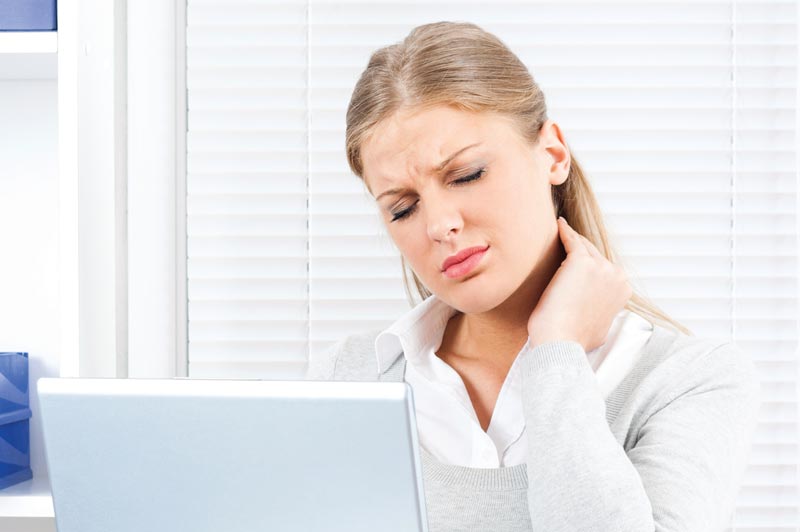
Neck pain is a common condition that can range from mild discomfort to debilitating pain. It may affect daily activities and diminish overall quality of life. Understanding the causes, how to relieve pain at home, how to manage your activity levels, and which medications may be beneficial can significantly improve your recovery process and prevent further complications.
Common Causes of Neck Pain
Neck pain often results from a variety of factors, both temporary and long-term. Some of the most frequent causes include:
● Poor Posture: Prolonged slouching, improper sitting, or looking down at phones or computers for extended periods can put a strain on the neck muscles and joints. Poor posture often leads to muscle fatigue and pain.
● Muscle Strain: Overexertion, sudden movements, or sleeping in an awkward position can result in muscle strain. This is one of the most common causes of acute neck pain.
● Injuries: Trauma, such as whiplash from a car accident or sports injury, can cause significant damage to the neck muscles, ligaments, and discs, leading to inflammation and pain.
● Herniated Disc: A herniated disc in the cervical spine can press on nearby nerves, causing sharp pain, tingling, or numbness in the neck, arms, or shoulders.
● Osteoarthritis: Degenerative changes in the cervical spine can lead to osteoarthritis, which causes the cartilage between the bones to wear down, resulting in pain, stiffness, and reduced mobility.

Dealing with Minor Neck Pain at Home
For many people, neck pain is a temporary and minor issue that can be addressed with simple at-home treatments. These approaches focus on reducing pain, easing muscle tension, and preventing further injury:
1. Apply Ice and Heat: During the first 24 to 48 hours, ice packs can be effective for reducing inflammation and numbing the affected area. After the initial inflammation subsides, heat therapy using a heating pad or warm towel can help relax muscles and promote blood circulation to the area.
2. Gentle Stretching and Mobility Exercises: Keeping the neck gently moving with specific stretches can help alleviate stiffness and maintain range of motion. Start slowly and only perform movements that do not increase your pain. A few simple exercises can make a big difference in reducing discomfort.
3. Mind Your Posture: When sitting, standing, or lying down, ensure that your neck is properly aligned with your spine. Avoid slouching, and use an ergonomic chair or cushion to support your neck during work or rest. Pay attention to your screen time and adjust your computer or phone so that you aren’t tilting your head downwards for long periods.
4. Massage and Muscle Relaxation: A gentle self-massage or professional massage can relieve muscle tension in the neck. Use circular motions to apply gentle pressure around the sore spots. Alternatively, some people find relief with the help of a massage device designed specifically for the neck area.

Managing Activity and Movement
While it's crucial to allow the neck some time to heal, it's also important to stay active to prevent further stiffness or weakness. The key is to maintain a balance between rest and movement:
● Avoid Overexertion: In the early stages of neck pain, avoid strenuous activities or heavy lifting that might exacerbate the injury. Refrain from activities such as heavy exercise, running, or lifting weights until the pain subsides.
● Perform Gentle Movements: Engaging in light activities, such as walking or gentle stretching, can help maintain muscle function and flexibility without overloading the injured area.
● Take Breaks: If you work at a desk or are using a computer for long hours, take frequent breaks to stretch your neck and move around. This helps prevent muscle tightness and improves circulation.
It is important not to remain completely sedentary. Resting too much can cause your muscles to stiffen, prolonging the healing process.

Medications and Pain Relief Options
In addition to self-care techniques, certain medications may provide additional relief for neck pain:
Over-the-Counter Pain Relievers: Nonsteroidal anti-inflammatory drugs (NSAIDs) like ibuprofen (Advil, Motrin) or naproxen (Aleve) can reduce inflammation, ease pain, and help with any swelling in the neck. These are generally effective for most people experiencing mild to moderate neck pain.
1. Acetaminophen: If you cannot tolerate NSAIDs or have a sensitivity to them, acetaminophen (Tylenol) is another option. While it does not reduce inflammation, it can help manage pain effectively.
2. Topical Treatments: Over-the-counter topical creams, gels, or patches, such as those containing menthol or capsaicin, can provide targeted relief to the affected area by creating a cooling or warming sensation that numbs the pain.
3. Muscle Relaxants: For more significant muscle spasms, a doctor may prescribe a muscle relaxant to help alleviate tightness and pain. However, these are typically used for short-term relief and should be taken with caution under a doctor’s guidance.
4. Prescription Pain Relief: If neck pain persists despite OTC medication, a healthcare provider may recommend stronger pain medications or physical therapy.

When to Seek Medical Attention
Most cases of neck pain improve with self-care, but it is important to seek medical attention if:
● The pain lasts longer than a week or worsens over time.
● You experience numbness, tingling, or weakness in your arms or hands.
● The pain is the result of an accident or injury.
● You experience a sudden loss of movement or inability to turn your neck.
● You have difficulty breathing or swallowing, or experience fever or unexplained weight loss.

Neck pain is a common issue, but with the right treatment and self-care strategies, it is often manageable and temporary. By understanding the potential causes, incorporating gentle stretches and good posture habits, and using medications appropriately, most people can recover quickly. If neck pain persists or worsens, however, don’t hesitate to consult a healthcare professional for further evaluation and treatment.
Subscribe means that you have read and agree to the Privacy Policy.
Subscribe means that you have read and agree to the Privacy Policy.
Copyright © Shenzhen Pango Medical Electronics Co.,Ltd, Ltd. All Rights Reserved.